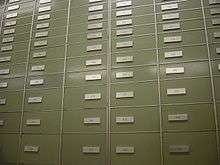Safe deposit box
- "Safe deposit" redirects here; not to be confused with Safedeposits in Scotland.


A safe deposit box, sometimes known erroneously as a safety deposit box,[1] is an individually secured container, usually held within a larger safe or bank vault. Safe deposit boxes are generally located in banks, post offices or other institutions. Safe deposit boxes are used to store valuable possessions, such as gemstones, precious metals, currency, marketable securities, important documents (e.g. wills, property deeds, or birth certificates), or computer data, that need protection from theft, fire, flood, tampering, or other perils. In the United States, neither banks nor the FDIC insure the contents.[2] An individual should purchase insurance for the safe deposit box in order to cover theft, fire, flooding, terrorist attacks and other natural disasters and catastrophes. Specialized insurance can be purchased covering all property in the box, including cash and important papers with no disclosure at the time of purchase through Safe Deposit Box Insurance Coverage (SDBIC). [3]
In the typical arrangement, a renter pays the bank a fee for the use of the box, which can be opened only with presentation of an assigned key, the bank's own guard key, the proper signature, and sometimes a code of some sort.[4] Some banks additionally use biometric dual-control security to complement the conventional security procedures.[5] The security measures utilized by many institutions often make safe deposit boxes a poor repository for wills, powers of attorney and other estate planning documents if the owner has not authorized additional signatories on the account.[6]
Many hotels, resorts and cruise ships also offer safe deposit boxes or small safes to their patrons, for temporary use during their stay.[7] These facilities may be located behind the reception desk, or securely anchored within private guest rooms for privacy.
The contents of safe deposit boxes may be seized under the legal theory of abandoned property.[8]
See also
References
- ↑ "Safe Deposit Box or Safety Deposit Box?". Straight Dope. Retrieved November 26, 2014.
- ↑ "Storing Gold Externally". Gold Buying Facts - Your one stop resource about how to buy gold. Retrieved November 10, 2014.
- ↑ "Valuables & Documents | Safe Deposit Box Insurance Company". safedepositboxinsurance.com. Retrieved 2016-08-19.
- ↑ FDIC Consumer News. November 2014.
- ↑ Thinking outside the safe deposit box: Florida Credit Union members use biometric HandReaders. SecureIDNews March 3, 2005.
- ↑ "Where should I keep my Estate Plan documents?". Pauper Planning Techniques. Curnalia Law, LLC. Retrieved July 13, 2014.
- ↑ Payne, Kirby D. Safety Deposit Boxes and In-Room Safes. Hotel Online data base of News and Trends.
- ↑ Liz Pulliam Weston. "Why treasures in safe deposit boxes get 'lost'". MSN Money.